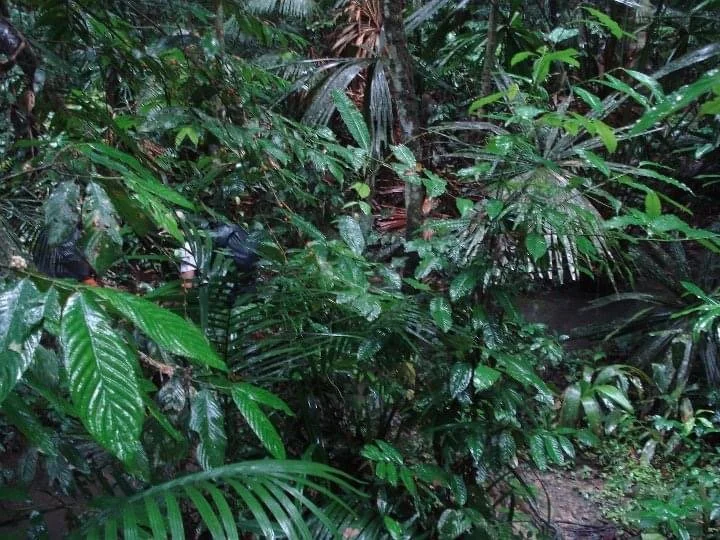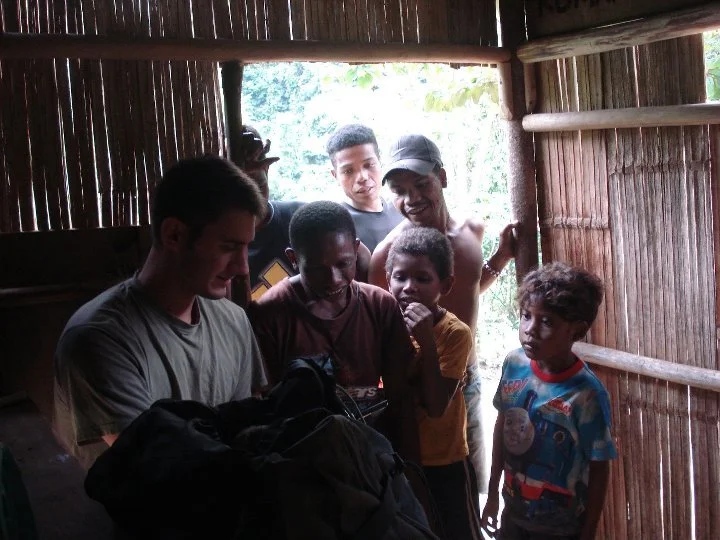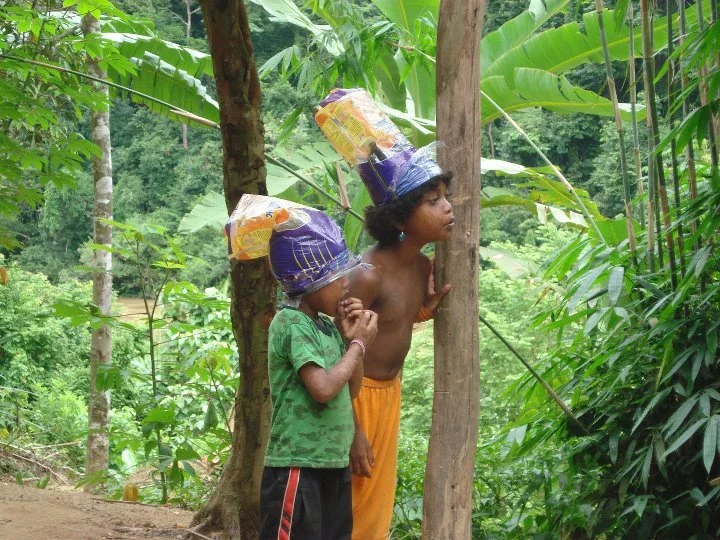A night at the Bateks
What I remember most was the noise made by the monsoon rain on the tin roof. Drops as big as hazelnuts that had been drumming furiously since earlier when the late afternoon storm had finally decided to break. Silently, we watched the water tumbling from the roof in thick curtains, hypnotized by this spectacle. Apart from the two of us, there weren't many people in this restaurant on stilts, whose disjointed floor revealed the muddy waters of the river below. No wonder, right during Hari Raya, who else would get lost here, in this village at the gates of the Malaysian jungle, other than two French tourists, whose taste for adventure was matched only by their lack of preparation? Obviously, at this time of year, no guide was available to take us hiking in the jungle as we had hoped when coming here. “We should have suspected that,” I said to Maxime, to whom this kind of consideration went completely over his head. He who in the morning had the habit of leaving for work without bothering to take his keys and who, when the evening came, counted on his lucky star that at least Lionel or I returned to the apartment before him to open the door for him. So, asking himself the question of being able to find a guide in the jungle…
We were about to order another round of lukewarm beer that would help the rain to pass, before trying to find ourselves a way to return to Kuala Lumpur the next day, when I noticed in the back of the room, hidden by the shadow of a table, a silhouette that I took at first to be that of a child but which, to my great surprise, when I bended to get a better look, turned out to be that of an adult man, barely five feet tall. black-skinned, similar in every way to those Africans from the Kalahari that we sometimes see in National Geographic documentaries, and whom, to be honest, I would never have expected to meet one day in the depths of Malaysia. Moreover, he himself seemed aware of the singularity of his presence in this place, because he had this hesitant look, which one can have when one is immersed in an environment which is foreign to us, he stood there intimidated, near the wall standing apart from others, in an indecisive attitude. Obviously he didn't seem to be a customer, what was he doing there? That was all it took to arouse our curiosity. Information taken from the waiter: this man was a Batek, one of the last hunter-gatherer peoples, living in the heart of the jungle. The Bateks lived in a village somewhere in the forest, up the river, which they rarely left but it sometimes happened, the waiter explained to us, that some ventured into town to look for medicine or to be hired temporarily as workers on construction sites.
You know as well as I do, in life there are moments when we have the impression of groping our way through a thick layer of fog, and there are others when, on the contrary, we could swear that unmissable signs have been deliberately placed in front of our noses to show us the path to follow. And when one of these signs presents itself, well, you have to follow it. So we went to see this Batek, to ask him if by chance he would agree to be our guide in the jungle, which he accepted. And with the help of the waiter who did the translation, we quickly agreed on the practical details and an appointment was made for the next morning at the riverside for departure. Our path had just crossed that of Abo, thanks to whom, we did not yet know, we were going to live one of the most significant human experiences of our lives.
When we are in one of those moments, where the path unfolds itself before us, like a long luminous ribbon, nothing can fail, so we were not surprised to find Abo exactly on time at the meeting point the next morning, when we arrived at the pier, after a short night of sleep haunted by the mocking croaking of the geckos observing us, lurking in the dark corners of our damp rooms. And after taking our place aboard a canoe just large enough for the three of us, making sure to distribute the bags to correctly balance the boat, we set off in the darkness, leaving the still sleeping city behind us.
Max and our guide Abo
The canoe was sliding across the mirror, cutting through the sheet of evaporation that had formed during the night on its surface. After a while, the banks were no longer visible and the layer of water had merged with that of mist by the first ray of sunlight, it was no longer possible to distinguish the top from the bottom, we might as well be sailing on a cloud. This suspended moment lasted about fifteen minutes and then suddenly, the mist dissipated and revealed the forest on either side like the leafy walls of a canyon which narrowed as we plunged ever deeper into the heart of the jungle. We went up the meanders of the river for long hours. In places, the water level was too low, forcing us to go down and walk in the water while pushing the canoe to be able to pass. On the banks the vegetation formed heavy impenetrable curtains which fell into the water, without leaving the slightest glimpse of the strange world which must have been hidden behind and which at that moment we could only imagine. Finally, at a point that only Abo was able to distinguish in the plant monotony, we stopped the canoe and hoisted it onto the bank, we took our bags as well as the equipment and following Abo, we entered the forest.
It was dark, the dense vegetation making progress difficult, forcing us to push aside the lianas and the large leaves of an intense green enhanced by a humidity so high that it seemed to form a viscous gangue suspended in the air. Far from the concert of animals that one might expect in a jungle, this one, on the contrary, was oppressively silent. We didn't come across any monkeys, snakes or even birds, nothing. As if the animal were hiding as we passed, holding their breath, stunned by the outrageous intrusion of man into their forest. Towards the end of the afternoon, it began to rain and the already dim light faded very quickly, so that it was completely dark when we finally arrived, soaked and exhausted, at a cave, or rather a rock shelter formed by a sloping cliff, which would be our camp for the night. While Abo lit a fire to boil dinner, with Maxime we went to get rid of the mud and dried blood from the leech bites in a stream not far away. In the cold, shallow water, myriads of small fishes attracted by the light of our headlamps came and pecked our skin. After a comforting meal, exhausted, we quickly fell asleep in our sleeping bags, only to wake up a few hours later in the middle of the night, awakened by a veritable cacophony of hoots, croaks, grunts and other complaints from the entire forest bestiary, which, having held back all day, then gave free rein to the entire richness of its repertoire. The next day we resumed our bashing through the jungle. On several occasions we found elephant dung, particularly at the entrance of caves, on the walls of which they like to come and lick the salt that oozes from it, but we did not see any more animals than the day before. And then, at the end of the afternoon, after a long tiring walk we reached the deep heart of the forest, and in the middle of it, a clearing with a small village of five or six huts: the village of Abo.
The whole village was gathered when we arrived, that is to say around thirty people at most, with a majority of children. Had we been creatures from another planet descending the ladder of our spaceship, they probably would not have looked more surprised. The children, with messy hair, were observing us unintimidated with big mischievous smiles while the adults, more serious, remained a little in the background. Abo then led us to a small hut which was allocated just for Maxime and me and then showed us around the village, in which we saw no trace of modern comfort, not even the slightest mechanical device. We discovered a community, in symbiosis with its forest, and whose way of life had depended entirely on it for thousands of generations. We were in the world’s origin matrix.
our hut for the night
showing pictures of Hornbill bird from another trip
In the evening, we were invited by the village chief to come and share dinner with his family. Sitting around a fire on the dirt floor, we were looking at each other smiling while waiting for the meal to cook. There was only a small pot of rice and one single chicken leg for everyone, certainly not enough for the family and even less with the two of us on top of that. And yet, they shared with us. We then took out the sandwich bread and other provisions that we had left from our trek and little by little, almost the entire village came to be able to eat. We understood that these people were actually on the verge of starvation.
children playing with the empty bags of bread
The next day in the canoe which took us back to civilization, to our life of young, party-loving and carefree expats, we remained silent, conscious of having been witnesses to the sad beauty of a people on the verge of disappearing.






